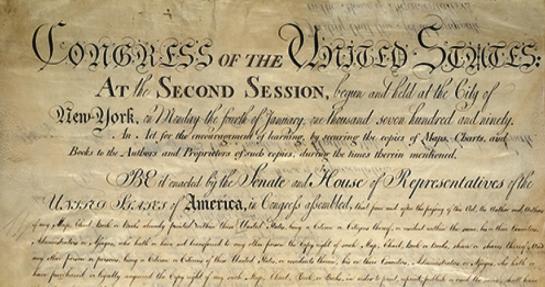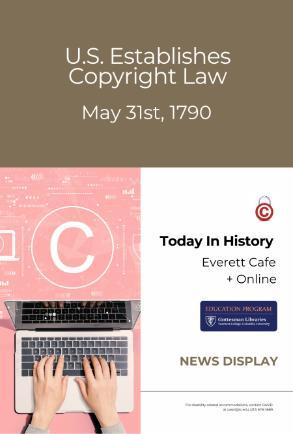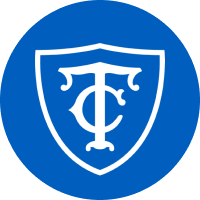Today In History: U.S. Establishes Copyright Law

On May 31st, 1790 the first federal copyright law was enacted under the United States Constitution; it protected books, maps, and charts for fourteen years after they were registered in district courts of states where the author or proprietor lived. The law was modeled after the Statute of Anne in Great Britain, and it allowed renewal for another fourteen years.
As needs grew and publishing increased, Congress amended the Copyright Act of 1790 many times over the next centuries. In 1831 protection of copyrighted works extended to 28 years, and in 1870 a Copyright Office was established within the Library of Congress. The scope of coverage would expand to many forms of published work: historical and other prints; dramatic works; photographs, visual art, music, and much more, while continuing changes to the law affected length of coverage, the process of registration, and digital mediums, including artificial intelligence.
Today, particularly for libraries, fair usage guidelines are necessary in ensuring the proper provision of resources for teaching, research, and scholarship. Fair use criterion emphasize: the purpose and character of the use, including whether such use is of a commercial nature or is for nonprofit educational purposes; nature of the copyrighted work; amount and substantiality of the portion used in relation to the work as a whole; and effect of the use upon the potential market for or value of the work.
The following articles are drawn from Proquest Historical Newspapers, which informs and inspires classroom teaching and learning.
- Today In History: The First American Copyright Law -- May 31st. (1910/05/31/, 1910 May 31). San Francisco Chronicle (1869-1922)
- First Copyright Law in U.S. Passed 126 Years Ago Today. (1916/05/31/, 1916 May 31). The Washington Post (1877-1922)
- Robertson, T. E. (1931/12/31/, 1931 Dec 31). Constitution Basis of Patent System: First Act of Congress Bear-ing on Inventors Approves April 10, 1790. The Washington Post (1923-1954)
- Casey, P. (1963/04/28/, 1963 Apr 28). Ancient Copyright Regulations Face Knives of Revisionists: New Methods Cited. The Washington Post, Times Herald (1959-1973)
- Copyright Law. (1971/01/10/, 1971 Jan 10). The Sun (1837-)
- Technological Advances Play Havoc with Copyright Law. (1975/09/21/, 1975 Sep 21). The Hartford Courant (1923-)
- Zeitlin, S. Z. (1998/04/25/, 1998 Apr 25). Strangling Culture with a Copyright Law. New York Times (1923-)
- Rivenburg, R. (2000/09/29/, 2000 Sep 29). Whose Art Is It, Anyway? Los Angeles Times (1996-)
- Coulter, C. (2002/07/16/, 2002 Jul 16). Internet a Challenge to Copyright Law -- Judge. The Irish Times (1921-)
- Moroney, M. (2016/11/24/, 2016 Nov 24). A Worldwide Effort to Stop the Web Losing Its Memory: The Internet Archive, Which Harvests 250m Webpages a Week, Is 20 Years Old. The Irish Times (1921-)

Tips:
- Deazley, R., Kretschmer, M., & Bently, L. (2010). Privilege and Property : Essays on the History of Copyright (1st ed.). Open Book Publishers. https://doi.org/10.11647/OBP.0007. e-book
- Dulong de Rosnay, M., De Martin, J. C., & Nesson, C. R. (2012). The Digital Public Domain : Foundations for an Open Culture (1st ed., Vol. 2). Open Book Publishers. https://doi.org/10.11647/OBP.0019. e-book
- Gillespie, T. (2007). Wired Shut: Copyright and the Shape of Digital Culture (1st ed., Vol. 1, pp. viii–viii). MIT Press. https://doi.org/10.7551/mitpress/7253.001.0001. e-book
- Slauter, W. (2019). Who Owns the News? : A History of Copyright. Stanford University Press. https://doi.org/10.1515/9781503607729. e-book
- Sundara Rajan, M. T. (Mira T. (2011). Moral Rights Principles, Practice and New Technology (1st ed.). Oxford University Press. e-book
- United States Copyright Office
- Gottesman Libraries' Copyright Page with additional resources
Images:
- Copyright Act of 1790, from the Timeline of the U.S. Copyright Office
- Poster Image: Copyright, Courtesy of Canva
Need to keep current, look to the past, teach a topic? The Everett Cafe features daily postings of news from around the world, and also promotes awareness of historical events from an educational context. Be sure to check additional Cafe News postings on the library blog.


